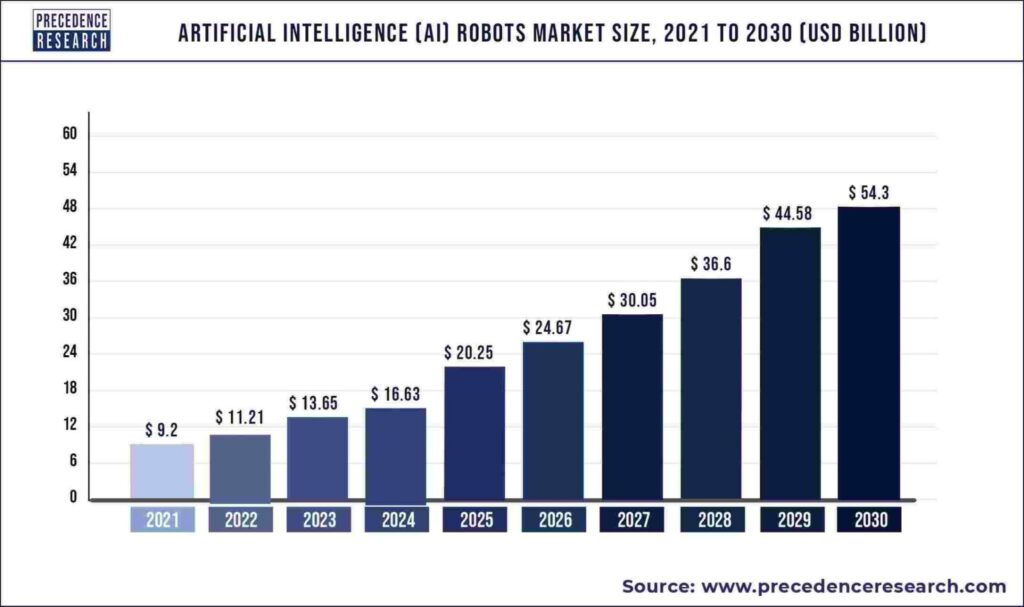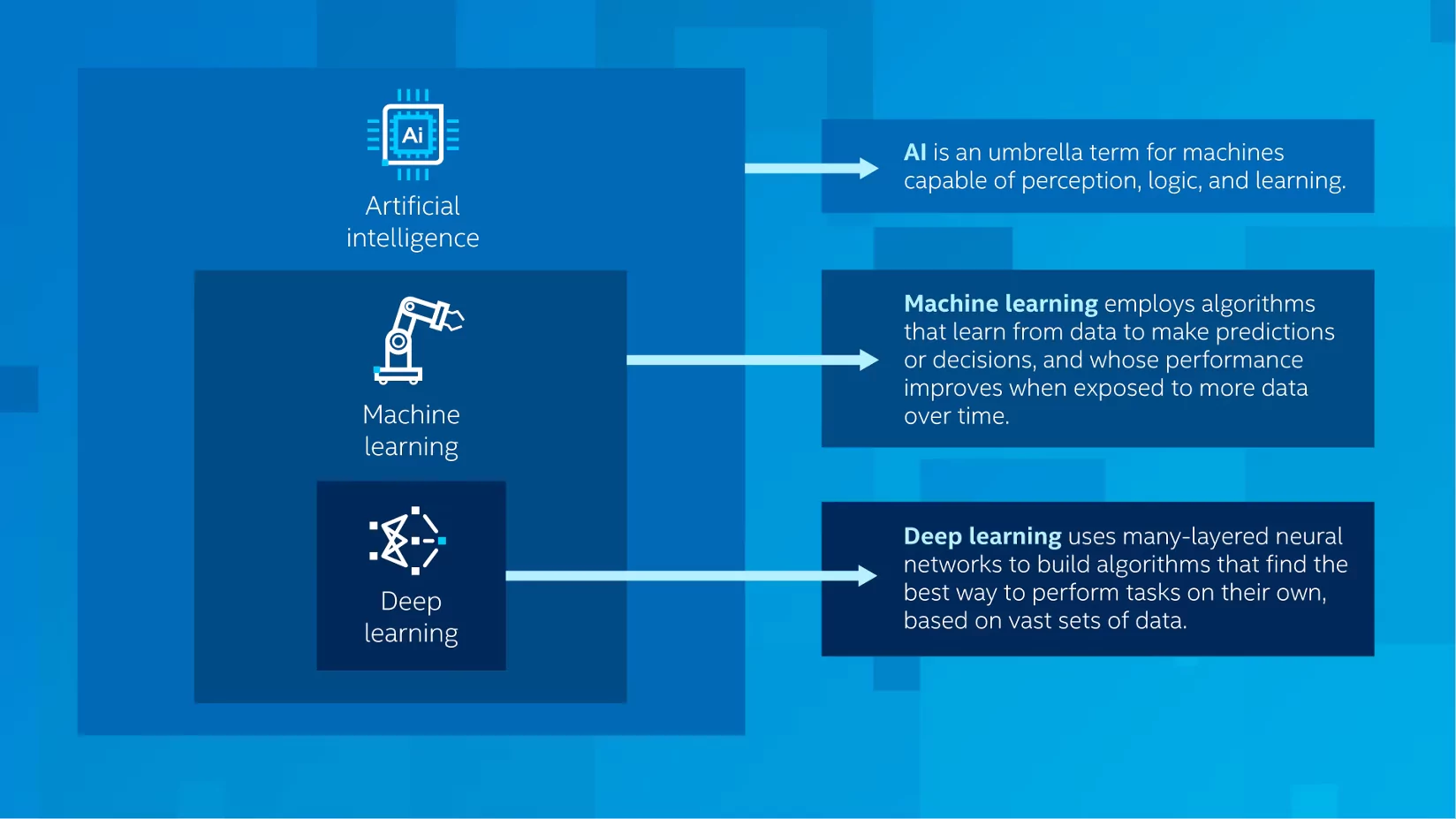
Artificial Intelligence (AI) and robotics can be confusing, but they are two separate technologies that exist on their own. Robotics is the area of science that works with the design, creation, and usage of robots. In contrast,
Artificial Intelligence (AI) is the science of developing a system of intelligent machines that can behave, act, and communicate with their users in a manner akin to that of a human. As per the reports, by 2027, the global AI robot market is projected to be $37.9 billion, rising at a market growth rate of 32.3% CAGR. This means that shortly, AI will increasingly be used to make robots ‘smarter’ and more efficient for humans.

Understanding AI and Robotics
When we talk about AI and Robotics, it’s important to know they’re not exactly the same. Robotics is about building and programming machines to do things without people controlling them. On the other hand, AI is all about creating systems that can think like humans, learn, solve problems, and make decisions on their own.
AI and robotics have been around for quite some time, but it really took off in the 20th century when engineers started making machines that could move and act like humans. Now, you can find robots in lots of places like factories, hospitals, space exploration, and self-driving cars. With AI, it’s crucial to understand how computers are taught to be smart using things like machine learning, networks, fuzzy logic, and deep learning.
What Are AI-Powered Robots?
AI-driven robots are equipped with an array of sensors, including vision tools like 2D/3D cameras, vibration sensors, proximity sensors, accelerometers, and other environmental detectors. These sensors provide them with real-time data for analysis and immediate action.
To grasp the concept of AI-enhanced robots, it’s crucial to comprehend what makes them intelligent. Artificial intelligence encompasses a wide range of systems that empower machines to replicate advanced human abilities. The diagram below illustrates several methods for achieving AI.

When AI is integrated into robots, it can drive innovation and transformation within businesses.
The question of why AI and Robotics go hand in hand in this technological boom is obvious. However, we will still ponder a few explanations for this growing symbiotic relationship!
1. AI Makes Robots More Intelligent: Artificial Intelligence can contribute immensely to making robots more intelligent!! Where robotics is an understanding of how to build, program, and use robots to carry out certain tasks. Robots must be able to detect and interact with their surroundings, make judgments, and take the right actions to complete these jobs. Using AI and robotics to learn, reason, and make decisions based on data, can make robots more intelligent. Robots with AI capabilities can pick up on human gestures and speech, thereby helping them get more proficient in the tasks they’re performing while also ensuring human safety.
2. Robotics Can Provide A Platform For Testing AI: Before AI systems are implemented in the real world, they are thoroughly tested in simulation settings. These simulations don’t always represent real situations perfectly, and thus Robotics offers a platform for testing AI in practical settings. Robots can be used in various environments, including manufacturing plants, healthcare, and space exploration. These settings offer various challenges that can assist, hone, and enhance AI algorithms.
3. AI Can Help Power More Complex Tasks In Robots: Several tasks are too risky or challenging for humans. Robots can easily carry out those tasks while mitigating casualties. Having said that, several tasks are challenging for robots too. A fusion with AI can help increase their efficiency. With autonomous vehicles, for instance, robots can utilize AI to decide how to navigate the environment. At the same time, humans can supervise the entire operation and assume control if necessary.
4. AI Can Help Increase Productivity And Efficiency: Demands on businesses today are higher than ever. Customers expect speedier deliveries, and stakeholders want improved productivity and greater efficiency while ensuring workers don’t suffer from weariness or accidents. AI-powered robots are beneficial on all fronts. Retailers carry out repetitive or time-consuming duties, including inventory checks and notifying staff of out-of-stock or lost items. This speeds up product delivery, boosts productivity, and frees up human workers to focus on higher-level, less physically demanding duties such as developing innovative new ideas or looking for ways to make operations better.
5. AI and Robotics help in agriculture: In farming, modern technology is used to make things better and boost productivity. AI can predict weather and inform farmers about fertilizer and water. It also updates them about the best time to harvest their crops. Robots are also used to do hard work on the farm, like planting seeds or picking fruits, so farmers don’t have to do it all themselves. This saves time and makes farming more efficient. Let’s check out some ways AI robots are used in farming.
6. AI and robotics in healthcare: Smart robots in healthcare speed up surgeries and help patients get better faster. These AI robots do many jobs in hospitals, like passing on equipment, aiding patients, and even performing surgeries. They also handle paperwork and other office tasks.
For example, Moxi by Diligent Robotics helps hospital staff with non-patient tasks. It brings surgical tools, lab samples, and medicine to doctors so they can focus on important matters. These robots also look after patients by checking their health stats, giving them medicine, and helping with their needs.
Futronics created an AI system for healthcare. It watches over patients all the time, collecting their health data and making decisions for their well-being. These robots also assist patients with exercises, getting around, and bringing them food.
Why AI and Robotics are our Future

AI and Robots hold huge promise for our future. Even though these technologies are still new, we can expect more exciting developments in the years ahead as researchers explore their possibilities. Here are five reasons why robotics and AI are crucial for what’s to come:
- They can make our lives much better, especially in the education sector and at home. Human-like robots are improving personalized learning, and cloud-connected robots can handle chores like cleaning and cooking at home.
- They can help solve big problems like climate change, energy shortages, and healthcare issues.
- They can automate many of the boring tasks we do every day, giving us more time and energy for fun and creative things.
- They give us new ways to understand and protect nature, helping us build a sustainable future.
- They offer the hope of a fairer society where everyone, no matter where they come from, has the chance to succeed.
What Do We Conclude?
AI robotics is a growing market, and it is expected to be $50872.43 million in 2028.
It is believed that robotics fueled by artificial intelligence will disrupt every industry in the coming years, from manufacturing to healthcare to agriculture and transportation. A symbiotic relationship between AI and robotics will not only deal with industry- and business-specific challenges like efficiency, productivity, and worker safety but will also revolutionize future businesses when used effectively and wisely.
Want to make your child future-ready with Robotics? Moonpreneur offers a tailor-made program. Reserve a spot in our free 60-minute workshop today and introduce them to the amazing world of robotics and innovations!
Update: This article was last updated on 23rd January 2026 to reflect the accuracy and up-to-date information on the page.


























Is robotics better than AI?
The choice between AI and robotics depends on the specific task at hand. For instance, if the task involves analyzing large amounts of data or making decisions based on that data, AI may be the best option.
Can robots with AI learn from their mistakes?
Yes, AI algorithms enable robots to learn from experience through techniques like machine learning and reinforcement learning. They can analyze data from previous interactions to improve their performance and decision-making capabilities
I have read that robots with AI will start acting on their own, beyond their initial tasks. Is this true?
It’s a common misunderstanding that AI-powered robots can act on their own like humans. In reality, robots can only do tasks they are programmed for and cannot develop new abilities independently.